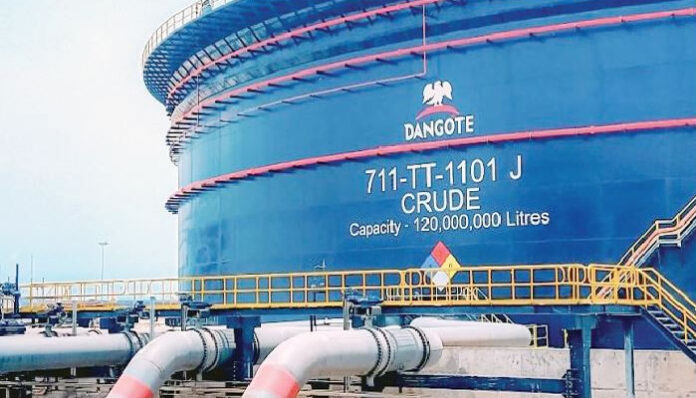The management of Dangote Refinery has condemned a directive issued by the Petroleum and Natural Gas Senior Staff Association of Nigeria (PENGASSAN) asking its members to cut off gas and crude oil supply to the refinery. The company described the move as an act of economic sabotage and called on the Federal Government to step in immediately to prevent further disruption.
This development follows recent tension between the oil union and Dangote Refinery after the company reportedly terminated the appointments of over 800 workers who are members of PENGASSAN.
Reacting to the mass sack, the union had threatened nationwide industrial action, ordering its members to halt supply of crude oil and gas to the $20 billion, 650,000-barrel-per-day refinery located in Lagos.
In a statement released on Saturday, the refinery management expressed deep concern over the union’s directive, describing it as “criminal, lawless, and reckless.” It accused PENGASSAN of trying to sabotage Nigeria’s economy and jeopardize what it called a “strategic national asset.”
“The follow-up question is, in whose interest and on whose behalf is PENGASSAN directing and intending to inflict such anarchic and criminal disruption upon the Nigerian society and persons living in Nigeria?” the statement read.
“Most certainly not in the interest of the Nigerian State or its citizens. This is also economic sabotage against the Nigerian State at multiple levels.”
Dangote Refinery noted that it is currently the only refinery of its kind in Africa, with the capacity to transform the continent’s energy sector. The company said rather than attacking the project, labour unions and Nigerians at large should see it as a “national pride” that deserves protection and support.
“Dangote Refinery is a one-of-a-kind project in Africa and should be the pride of Nigerians and the government,” the company stated. “An irreparable injury to the refinery constitutes a national embarrassment to all of us.”
The refinery appealed to President Bola Tinubu’s administration to intervene urgently to prevent what it described as industrial sabotage. It urged security agencies and law enforcement to investigate and stop any actions that could hurt the refinery or disrupt its operations.
“We are, by this write-up, drawing the attention of the Federal Government and its security and law enforcement agencies – as well as all other levels of government in Nigeria – to this criminal and irresponsible conduct of PENGASSAN,” the statement said. “We urge the government to call the union to order before things escalate.”
However, the refinery’s statement did not directly address the core issue raised by the union — the sudden sack of over 800 Nigerian workers, many of whom were reportedly part of PENGASSAN. The company has remained silent on the alleged unfair treatment and did not provide details or justification for the mass layoffs.
PENGASSAN had earlier vowed to take “all necessary action” to defend the rights of its members. The union said it would not allow any company, no matter how big, to “trample on the dignity of Nigerian workers.”
In its own statement, the union accused Dangote Refinery of engaging in arbitrary and unjust termination of employment without due process. It described the sack as a violation of workers’ rights and labour laws.
“We will resist any form of intimidation or oppression of our members, and we are ready to mobilize across the country to protect their interests,” a union spokesperson said.
The union’s decision to shut down crude supply is being seen as one of its strongest responses in recent times, and it has already triggered reactions across the oil and gas industry.
The Dangote Refinery, commissioned in May 2023, is Africa’s largest single-train refinery and is seen as a potential game-changer for Nigeria’s fuel supply, which still relies heavily on imports despite being a major oil producer.
The project is expected to reduce Nigeria’s dependence on imported refined petroleum products, create jobs, and boost the local economy. However, this recent labour face-off poses a serious threat to its operations and future prospects.
For now, all eyes are on the Federal Government to step in and mediate the crisis before it spirals out of control.

